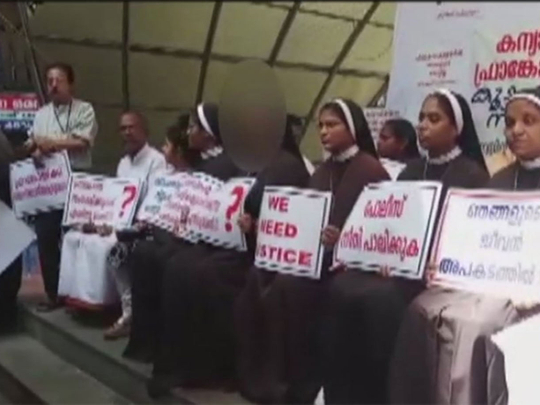
Thiruvananthapuram: The Catholic Church in Kerala witnessed an unprecedented situation on Saturday as a group of nuns from Kuravilangad in Kottayam district carried out an open protest demanding arrest of the bishop of Jalandhar who is accused of raping their fellow nun.
Five nuns from the convent in Kuravilangad joined family members of the nun who has alleged that Jalandhar Bishop Franco Mulakkal had sexually abused her multiple times. The protest was held symbolically in front of the Kerala High Court in Kochi.
“We have not got justice from the church, the government or the police,” the aggrieved nuns said, explaining the reason behind their decision to take their protest to the streets.
They said it was 74 days since the investigation began and the bishop has continued to roam free. “Is it because he has money and power that he cannot be arrested?” asked the nuns.
Kerala: Nuns in Kochi sit in protest demanding the arrest of Bishop of Jalandhar Franco Mulakkal, accused of allegedly raping a nun. The protest, underway at High Court Junction bus station in the city, has been called by
— ANI (@ANI) September 8, 2018
Joint Christian Council. pic.twitter.com/HaTbicQVNE
The nuns and other protestors held up placards with slogans against the bishop. One of the placards read, “Arrest the bishop who has broken the sixth commandment”, referring to the commandment from Christianity’s Ten Commandments which says one shall not commit adultery.
Political observer Sebastian Paul commented, “What he is accused of is worse than adultery, he is accused of rape”.
There is also apprehension whether the bishop’s arrest would be delayed further because he is due to attend a bishops’ synod at the Vatican in early October. There have been demands to prevent his foreign travel.
The development is a severe setback for both the Communist Party of India (Marxist)-led state government which has no convincing reason for delaying the arrest of the bishop, and also for the Catholic Church in Kerala which has not given a reason for not taking any action against the bishop.
On social media, both the government and the church faced flak for the delay in action against the bishop. One commentator described the protest of the nuns as “a public statement regarding the failure of the church and the state”.












